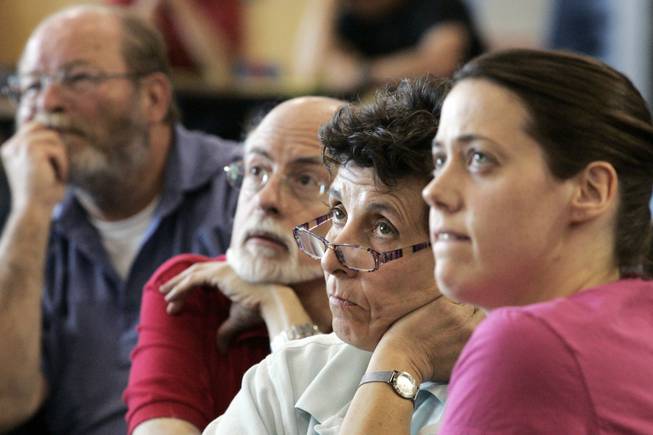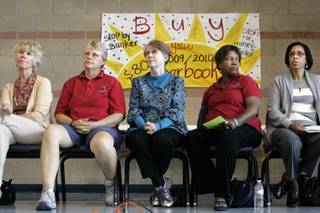
Teachers Stan Lasker, from left, of Bailey Middle School, Teresa Testa of Robert Lake Elementary School and Elizabeth Baker of Newton Elementary School listen during a Clark County Education Association bargaining update meeting Tuesday at Del Sol High School.
Thursday, April 22, 2010 | 2 a.m.
Sun archives
- ‘Almost catastrophic’ budget cuts on horizon for Clark County schools (4-22-2010)
- Clark County teachers face peer pressure on furloughs (4-9-2010)
- School Board rejects moving schools to nine-month calendar (3-26-2010)
- Year-round schools could face calendar shift to save money (3-16-2010)
- Teachers resist increasing pressure to accept pay cuts (2-5-2010)
- Budget crunch puts shorter school year, teacher pay cuts on table (2-4-2010)
- Gibbons: School districts should brace for 10 percent cuts (2-2-2010)
It’s just before 5 p.m. and the cafeteria at Del Sol High School on East Patrick Lane is filling with elementary and secondary school teachers, tired after a long day at work and wondering about their futures.
About 200 seats will be filled with a cross-section of teachers — veterans with decades of experience in the Clark County School District and younger ones starting their careers.
They’re just a small percentage of the 12,800 dues-paying members of the Clark County Education Association, but union leaders are pleased because it’s a decent turnout for a Tuesday night.
They are here to be updated on the budget crisis and contract negotiations.
While they wait for the start, teachers talk quietly with each other or pull out stacks of papers, the fruits of their day in the classroom. There’s still work to be done, even in the face of a budget crisis and possible pay cuts.
Ruben Murillo, president of the union representing the majority of the district’s 18,000 teachers, steps up to the microphone.
We know there are a lot of rumors out there, Murillo says. Here are the facts.
He’s got the teachers’ attention.
Some teachers begin taking notes. Others are tapping at their cell phones, sending text messages highlighting Murillo’s remarks to colleagues who can’t be here.
The district has to cut $145 million from its operating budget for the 2011 fiscal year that begins July 1. A plan to cover the bulk of that shortfall is in place: increasing class sizes in grades 1-3, letting most of the 76 year-round schools go back to nine-month calendars and delaying replacing textbooks and instructional materials.
There’s $28 million still to cut, and it’s almost certainly going to come out of personnel costs, which account for nearly 90 percent of the district’s $2.1 billion operating budget.
There are a variety of scenarios on the table, the teachers are told.
One of the proposals calls for all teachers to take several unpaid days off, but would allow two thirds of the district’s teachers — from the rookies to those in the upper middle range of the experience ladder — to move up a half-step on the salary schedule. Only the most experienced teachers, those who are earning top pay, wouldn’t have the sting of furloughs offset by salary bumps.
We’re going to need your help making some tough decisions, Murillo says.
The teachers have questions. They line up at two microphones to ask them.
What about job security? Are layoffs really going to happen?
At this time last year, nearly 150 teachers were without assignments as a result of budget cuts. Nearly all landed positions that came open as people decided to leave the district or were promoted to administrative posts. The union expects a similar success rate this time around, Murillo says.
One teacher has a more immediate problem. She teaches preschool children from high-poverty neighborhoods. The program is being canceled. What can the union do?
That’s beyond the union’s reach, she’s told. The best she can hope for is to land a similar position at another campus.
“This is going to hurt the kids,” the teacher says. “We’re talking about fixing the money problems today. Nobody’s thinking about what this does to our future.”
Teachers want to know how they’re supposed to manage the extra work of larger class sizes, or how they’ll pay for the required continued education courses they need to keep their licenses current.
When are the cuts going to end? Is this the last round? Are there more to come? How bad is it going to get?
That’s in the hands of the 2011 Legislature, says John Jasonek, who recently retired as the union’s executive director and now serves as a consultant.
What will be the tipping point? What will it take for the public — especially parents — to put enough pressure on lawmakers that education is properly funded?
It’s a question Jasonek said dates back three superintendents.
“I had that conversation with Brian Cram and I had the conversation with Carlos Garcia,” Jasonek says. “And now I’m having it with Walt Rulffes.”


Join the Discussion:
Check this out for a full explanation of our conversion to the LiveFyre commenting system and instructions on how to sign up for an account.
Full comments policy